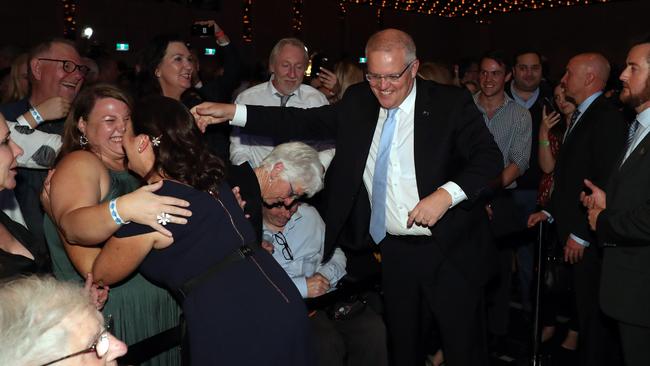Scott Morrison’s shock election result pinned on volatile voters
Scott Morrison defied every opinion polls and public expectation to lead the Coalition to a shock election victory. Now a study has looked at what happened.

Federal Election
Don't miss out on the headlines from Federal Election. Followed categories will be added to My News.
Volatile voters who told opinion polls they wouldn’t support any major political party confounded strong forecasts of a Labor victory in the May 18 election.
Many of those “don’t know” or “other” opinion survey respondents — about 30 per cent by one measure — moved to the Coalition without their shift being detected.
Simply put, they told pollsters one thing and did another.
The decisive transfer of support has been mapped by the first investigation of voter volatility, conducted by the Australian National University’s Centre for Social Research and Methods.
The study, Predicting the Unpredicted, argues it has found why opinion polls got it so wrong.
“We saw a swing towards the Coalition during the election campaign that came mainly from those who’d intended to vote for minor parties, or didn’t know who they would vote for,” Associate Professor Nicholas Biddle said today.
“Obviously, this swing was not picked up by the polls.
“The ‘other’ and ‘don’t know’ voters appear to have had a big impact on the May election.”
In April, Newspoll reported that Labor had 52 per cent of the two-party preferred vote to the Coalition’s 48 per cent.


The election saw the proportions reversed, with the Coalition on 51.5 per cent and Labor 48.5 per cent.
“Despite supposedly being in an era of ‘big data’, prediction markets that make use of far larger sources of information also failed to predict the election outcome,” the study found.
“Data like this is far and away the most powerful tool for understanding voter volatility and changes in voting intention and helps explain why the polls got it so wrong,” Mr Biddle said.
“In the past, we haven’t been able to measure voter volatility as a key driver of results. Clearly this election results shows that we need to.”
The study found that some 28 per cent of “don’t know” voters reported voting for a different party or party grouping in the May election.
The results “prove who a person says they’ll vote for on a particular day is a far from perfect predictor of who they’ll end up voting for”.
“More care and transparency about how these groups are treated should be a real focus of any adjustments to polling in Australia,” Mr Biddle said.
“In the end, polls are just sample surveys, often undertaken on a small percentage of the population. There’s a considerable skill and science around turning that into something more meaningful. Election polls tend to get pretty close, but like any survey, are prone to errors.”
Originally published as Scott Morrison’s shock election result pinned on volatile voters



